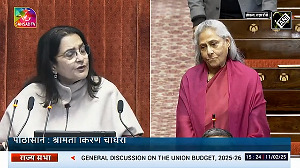Notwithstanding the controversy over sex education in schools, a government survey has found that most people feel the right age to teach children about HIV and changes in their bodies is at the beginning of their teenage years. More men agree with the view as compared to women.
The National Family Health Survey 3 (NFHS-3), which for the first time asked both men and women about providing information in schools on HIV/AIDS and related family-life topics, found most want the knowledge to be passed to the younger generation in schools.
About 63 per cent women and 82 per cent men said that HIV/AIDS should be taught to both the sexes. Though, 42 per cent women feel the right age should be 16 years, majority of men think the perfect age is 13 to 15 years.
The survey, which covered a total of 124,385 women in the age group of 15-49 years and 74,369 men in the age group of 15-54, also said women feel children should be taught about condoms at the age of 16.
About half of women approved of teaching girls about contraception and 42 per cent said boys should be taught about contraception.
While a majority said it should be first taught when children are at least 16 years of age, however, most men feel contraception should be taught in school as a subject.
Though, there could be difference among men and women about teaching children about sex-related matters, an overwhelming majority -- 98 per cent women and 99 per cent men -- agreed that children should be taught moral values in school and, maybe, even as young as 10 years.
The NFHS survey, whose final report was released recently, said in all states, approval among men and women is lower for teaching boys about changes in girls' bodies and vice versa.
Also, women in the country do not like boys being taught about the changes in girls' bodies.
In states like Rajasthan, Himachal Pradesh, Uttarakhand, Punjab, Uttar Pradesh, Orissa, West Bengal, Assam and Tamil Nadu most women do not approve teaching girls about boys' bodies. But most women also do not agree with teaching boys about bodies of girls.
"Approval of teaching sex and sexual behaviour in school and condom use to prevent sexually transmitted disease are relatively low in several states, particularly among women," it said.
Also, the acceptance among women about teaching contraception in schools is relatively low in large number of states, particularly for teaching the topic to boys. But majority of men feel that girls and boys should be taught about contraception in school.
"It is hoped that this nationally representative information, the first of its kind, will reinforce and help to guide programmes such as the School AIDS Education Programme," the report said.






 © 2025
© 2025